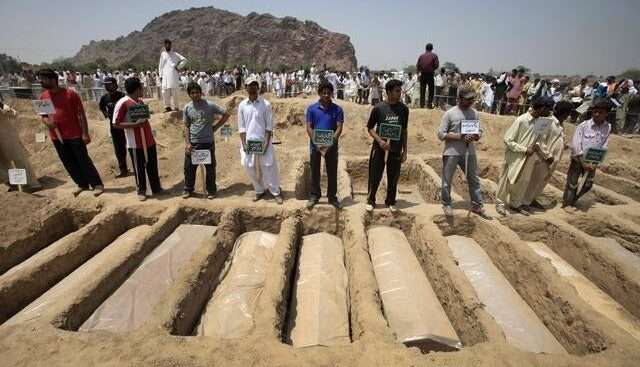Between April and June 2025, the Ahmadi community in Pakistan endured a relentless tide of violence, humiliation, and state-sanctioned discrimination that exposed the harrowing reality of their existence. According to a report by the International Human Rights Desk, a UK-based organization, the past months have been marked by targeted killings, widespread harassment, and the systematic destruction of places of worship. The patterns outlined in the report speak not just to the physical harm inflicted, but also to a deeper, more insidious cultural and institutionalized persecution that has, tragically, become routine.
The second quarter of 2025 has been particularly devastating. Eid-ul-Azha, a time meant to bring together families and communities in sacred worship and sacrifice, became another battleground for the denial of Ahmadi rights. What should have been a celebration of faith turned into an annual reminder of the brutal treatment faced by Ahmadis. Religious activists, bar associations, and local authorities colluded to obstruct their religious practices, forcing individuals in at least 18 districts to sign indemnity bonds under the threat of imprisonment.
Eyewitness accounts provide a heart-wrenching view into the daily struggles of the Ahmadi community. Over 150 instances of interference with ritual animal sacrifices were documented nationwide. In Lahore, 24 Ahmadi worshippers were arrested mid-prayer, their place of worship sealed. In Gujranwala, entire congregations were locked out of their prayer halls, while in Sargodha, worshippers were detained as they left their mosques. What should have been a peaceful expression of faith became a struggle for survival, as authorities sought to erase the right to practice one’s religion.
The violence inflicted upon Ahmadis in this period escalated into horrific acts of murder. In Karachi, Kasur, and Sargodha, three Ahmadis were killed in cold blood. The most shocking of these killings occurred on April 18, 2025, when Ahmad Cheema, a 46-year-old man, was lynched by a mob linked to Tehreek-e-Labbaik Pakistan (TLP) outside an Ahmadiyya center in Karachi. Shockingly, police were present but did nothing to intervene. Despite the brutality of this attack, authorities chose to register a case against the victims themselves, accusing them of violating the Pakistan Penal Code. This tragedy was only the beginning of a relentless campaign of violence.
On April 24, 19-year-old Muhammad Asif was murdered in Kasur, following years of harassment. Less than a month later, Dr. Sheikh Muhammad Mahmood, a respected 58-year-old gastroenterologist, was shot dead in Sargodha. Despite witnesses identifying the killer, justice remains elusive. These killings were not isolated events but part of a disturbing pattern of violence that targets Ahmadis simply for their faith.
The state’s complicity in this violence is evident in the custodial death of Tahir Mahmood, the local president of the Ahmadi community in Malir, Karachi. After being detained for two months on faith-based charges, Mahmood succumbed to illness, allegedly due to delayed medical treatment. His death underscores the systemic nature of persecution, where the state’s inaction and neglect play a central role in the suffering of Ahmadis.
The destruction of Ahmadi places of worship has reached new heights. Across Punjab and Azad Jammu and Kashmir, police, often at the behest of extremist groups like TLP, have facilitated or directly carried out the demolition of minarets, prayer niches, and the sealing of worship places. These actions are frequently conducted under the cover of darkness, with little regard for legal or human rights protections. In some cases, the authorities have even pressured the community to dismantle their own religious sites, further stripping them of their identity and rights.
The destruction of Ahmadi graves in Rodha, Khushab, adds another layer of pain to the community’s suffering. The desecration of these sacred spaces serves as a stark reminder that no aspect of the Ahmadi experience in Pakistan is safe from attack — not even in death.
The harassment faced by Ahmadis in their everyday lives is not confined to the destruction of their religious spaces or the violence they endure. They are systematically excluded from society. Children are expelled from schools, families are denied burial in common cemeteries, and criminal cases are fabricated against them. In public spaces, they are humiliated by mobs, with the police often arresting the victims instead of those responsible for the attacks. This culture of exclusion and fear permeates every aspect of life for the Ahmadi community.
The International Human Rights Desk highlights that the abuse faced by the Ahmadi community is not sporadic; it is systematic. This is not the work of rogue actors or isolated incidents, but a pattern sustained and reinforced by the explicit collaboration of local administrations, police, bar associations, and extremist organizations. Despite the glaring violations of both Pakistan’s constitution and international human rights law, the state remains complicit in these atrocities.
The Ahmadi community in Pakistan stands as a testament to the enduring strength of those who face not only violent persecution but a state-backed system that seeks to erase their very existence. Their fight for the freedom to practice their faith openly continues, but with every passing day, it becomes a harder battle. The question remains: how long can the international community stand by while such heinous violations unfold unchecked?
